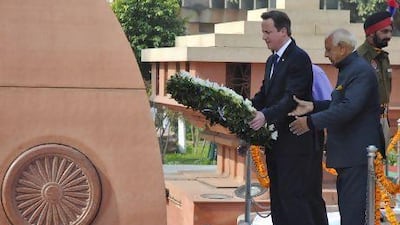NEW DELHI // Almost a century after British troops massacred hundreds of unarmed Indians in an Amritsar park, David Cameron became the first serving British prime minister to visit the site.
Colonial-era records estimate that 379 people died in the Jallianwala Bagh massacre, named after the park where it occurred in 1919, although Indian estimates have placed the death toll closer to 1,000.
Today, visiting the city of Amritsar on the final day of his three-day trip to India, Mr Cameron wrote in the official condolence book that the massacre was "a deeply shameful event in British history … We must never forget what happened here".
Mr Cameron's words were considered short of an outright apology, such as the one he delivered three years ago for the Bloody Sunday killings in 1972 in Northern Ireland, but a step further than Queen Elizabeth II's description of the massacre as "distressing".
"Writing a note in the visitors' diary is a half-hearted approach. He should have met us to say sorry," Bhusan Behl, who heads a trust for the families of Jallianwala Bagh victims, said. SK Mukherjee, the secretary of the Jallianwala Bagh memorial trust, spent half an hour guiding the British leader around the site, showing him a well into which 120 people jumped to their deaths and also bullet holes in the walls. Mr Mukherjee said Mr Cameron had struggled for words but had told him he was "regretful and this should not happen ever again" as he left the memorial which receives 20,000 visitors a day. The official plaque in Jallianwala Bagh reads: "This place is saturated with the blood of about two thousand Hindus, Sikhs and Muslims who were martyred in a non-violent struggle."
The crowd had gathered in the park, on April 13, 1919, to celebrate the harvest festival of Vaisakhi, flouting a colonial ban on public meetings. A British brigadier-general, Reginald Dyer, led 50 armed soldiers into the park to disperse the gathering. Blocking off the only gate into the park, he ordered his troops to fire continuously into the crowd for 10 minutes, exhausting 1,650 rounds of ammunition in the process.
Many men, women and children were killed in the firing. More died after they jumped into a well to avoid being shot, or in stampedes at the narrow exit.
Later, at an inquiry, Dyer claimed that he had been trying to preserve order and insisted that he had done nothing wrong. His actions earned him the epithet "The Butcher of Amritsar" and that helped spur the independence movement.
Many Britons both in India and in the UK supported Dyer's firing upon the crowd, holding that it prevented a mutiny similar to the one that happened in 1857.
The lieutenant-governor of Punjab, Michael Dwyer, wrote to Dyer, "your action is correct," and the House of Lords passed a motion expressing its support of dyer.
Others, however, were appalled. Winston Churchill, then a member of the British cabinet, described Jallianwala Bagh as "an extraordinary event, a monstrous event, an event which stands in singular and sinister isolation." In Amritsar there were calls for Mr Cameron to make a full apology to "assuage the feelings of patriots and relatives of the victims [and] confirm condemnation of brutal acts on innocent people by a British general," Bhushan Behal, president of an organisation of victims' families, told the Press Trust of India.
But Mr Cameron later defended his decision not to say sorry, explaining that it happened 40 years before he was born and "I don't think the right thing is to reach back into history and to seek out things you can apologise for."
"I think the right thing is to acknowledge what happened, to recall what happened, to show respect and understanding for what happened," The Guardian newspaper quoted him as saying. William Dalrymple, a British-born and New Delhi-based writer and historian of colonial India, said that an apology from Mr Cameron would be futile.
"I'm all for politicians apologising for mistakes they make," Mr Dalrymple said. "But it's meaningless for Tony Blair, for instance, to apologise for the Irish potato famine, because he's not responsible for that. For David Cameron to apologise when he is in the midst of a trade mission, in particular, makes no sense."
ssubramanian@thenational.ae
With additional reports from Agence France-Presse

